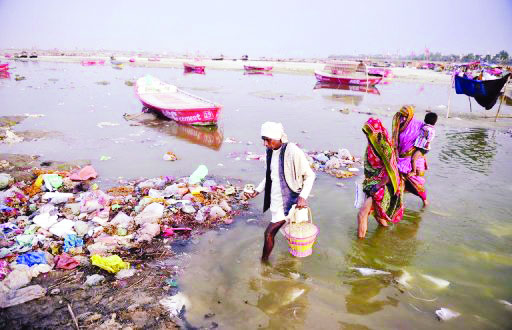The destruction of wetlands, one of the crucial ecosystems for humans, plants and animals, must ring alarm bells. Restoration and conservation policies need a re-think
From mangrove forests to coral reefs on the coast to peatlands to floodplains inland, wetlands play a crucial role in the fight against climate change and help make urban areas more sustainable. As countries are increasingly working hard to implement the Paris Agreement, to keep global temperatures well below two degree Celsius and as close as possible to 1.5°C, wetlands are quickly emerging as the only robust mechanism, especially in urban and coastal areas to not only reliably store carbon, but also act as an effective barrier to the unavoidable impacts of climate change.
However, wetlands across the world are getting diminished mainly due to policy paralysis and subversion of land use and this does not bode well for the fight against climate change. Currently, more than 64 per cent of the world’s wetlands have been lost since 1990, and as wetlands are destroyed, more carbon is released into the atmosphere, thereby contributing to a global temperature rise. With half of the world’s population now living in urban areas, with this number set to increase to 66 per cent by 2050, there is an increasing tendency to encroach on wetlands to build and develop infrastructure.
As humanity progresses and prospers, we seem to be intent on scoring self-goals as far as environment is concerned. Nothing else can explain the undermining of the healthy wetland system that has multiple benefits. Intact wetlands are the first line of defence against flooding in urban areas, acting as large sponges that absorb floodwaters. Coastal cities, mangroves and saltmarshes work as the best natural defence against storm surges and restoring the same can contribute effectively towards the removal of carbon from atmosphere.
According to a study published in the journal, ‘Frontiers in Ecology and the Environment’, compared to the carbon sequestration potential of marine ecosystems of coral reefs and kelp beds, mangroves, salt marshes and sea grass meadows have the greatest impact in meaningfully slowing down the process of climate change. The study concludes by terming coastal wetlands as the best of the marine ecosystems to fight climate change. But these very assets to fight climate change are on the decline and are in urgent need of restoration, this would surely have stemming impact on deteriorating environment by firstly curbing the emissions and secondly conserving the ecological biodiversity of the region.
Coastal wetlands take in carbon quickly and hold it for a long time, but if they are not protected, ecosystems could release huge amounts of greenhouse gases into the atmosphere, potentially jeopardising the ability of the urban hinterland to handle rising emissions and pollution levels. One reason coastal wetlands are such a good tool to cut emissions is because they’re fairly easy to manage and conserve and in-turn provide the best climate change mitigating services, as compared to other natural options, such as marine systems, like phytoplankton. Phytoplankton are dependable and long-term carbon sinks, but it is incredibly challenging to create a policy that manages billions of microscopic photosynthesising creatures found all over the ocean. Compared to options such as these, it's much easier to oversee coastal wetlands.
India, with its growing pollution problems, can find the best solution in wetlands to fight the dismal environment conditions. Moreover, with a 7,517 km coastline, we can develop, restore and encourage wetlands along the coast that can effectively battle climate change. However, authorities seem to see the real estate potential of the wetlands and not the climate change mitigation potential. In 2017, the Ministry of Environment, Forests and Climate Change published the new wetlands rules under the Wetlands (Conservation & Management) Rules-2017.These replaced earlier rules dating back to 2010 and in the process also did away with the National Wetlands Authority created under the 2010 rules and conferred all regulatory powers on the State Governments. These rules attracted much criticism from environmentalists and citizens alike at that time.
While the BJP-led Government ensured that critical aspects, such as commercial tax collection, were being centralised in order to improve tax collection and control evasion, wetlands management was handed over to respective State Governments with blurred definitions of what constitutes a wetland. This has enabled the State Governments to quickly label these as waste lands that could be developed as landfills or auctioned off for revenue to real estate developers. No other cultured and educated country in the world could possibly outdo what India did to its wetlands; it is the proverbial self goal we always do on matters pertaining to environment.
For a country battling droughts and floods caused by destructive land-use change — say, by changing agricultural lands to industrial use — and climate change, the feeble wetland regulations can have disastrous consequences, especially since only bad environmental laws are diligently enforced. The National Green Tribunal in conjunction with the efforts of the Supreme Court and assistance from the Government must come forward with a unified strategy that includes effective implementation of strict rules to safeguard wetlands. Only a multi agency effort such as these can have the desired results and prevent wetlands from being misappropriated and leading to their eventual extinction.
(The writer is an environmental journalist)


























